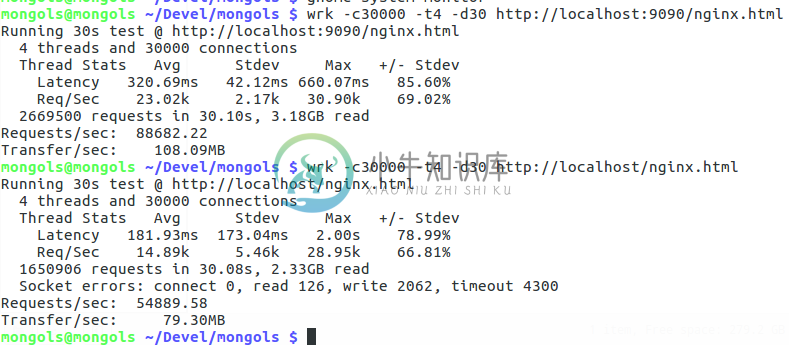多进程化
优质
小牛编辑
140浏览
2023-12-01
mongols提供的所有服务器设施既可以多线程化也可以多进程化。
并且支持在多进程化的同时多线程化。
来看代码:
#include <mongols/util.hpp>
#include <mongols/web_server.hpp>
#include <sys/prctl.h>
#include <sys/signal.h>
#include <sys/wait.h>
#include <unistd.h>
#include <algorithm>
#include <functional>
#include <iostream>
int main(int, char**)
{
// daemon(1, 0);
auto f = [](const mongols::request& req) {
if (req.method == "GET" && req.uri.find("..") == std::string::npos) {
return true;
}
return false;
};
int port = 9090;
const char* host = "127.0.0.1";
mongols::web_server
server(host, port, 5000, 512000, 0);
server.set_root_path("localhost:9090","html");
server.set_root_path("127.0.0.1:9090","html");
server.set_mime_type_file("html/mime.conf");
server.set_list_directory(true);
server.set_enable_mmap(true);
// if (!server.set_openssl("openssl/localhost.crt", "openssl/localhost.key")) {
// return -1;
// }
std::function<void(pthread_mutex_t*, size_t*)> ff = [&](pthread_mutex_t* mtx, size_t* data) {
server.set_shutdown([&]() {
std::cout << "process " << getpid() << " exit.\n";
});
server.run(f);
};
std::function<bool(int)> g = [&](int status) {
return false;
};
mongols::multi_process main_process;
main_process.run(ff, g);
}
多进程化最合适的场景是web_server,可以显著提升性能:



以上测试使用4个工作进程,对比于使用同样数目工作进程的nginx,更胜一筹。实际上,在同等使用单进程的情况下,mongols也比nginx更快更稳定!nginx 也是一朵浮云。
子进程重启
如需子进程重启,可向管理进程发送SIGHUP信号。当然,如果子进程非正常终止,例如被killed,子进程会自动重启。
注意
虽然mongols所包含的所有server均可以如上例所示进行多进程化从而提升性能,但是因为其中的一些server内部包含了leveldb或sqlite组件,而这两种组件只支持多线程化,并不支持多进程化,所有在对这些server进行多进程化时,ff函数应该包含一些配置数据库的代码,使得不同工作进程绑定不同的数据库。具体实现可参考example。
这一点非常重要。
不过话说回来,mongols提供的服务器在单进程情况下,性能已经非常优越了。在多数情况下,无需做多进程化即可满足——还能避免无谓的复杂代码。
多进程化其他网络库
mongols配备的多进程化工具是通用的,可用于其他网络库的多进程化。这里给出一个libevent的例子,其实只需在这里中的libevent例子里稍微添加几行代码:
#include <cstring>
#include <event2/buffer.h>
#include <event2/event.h>
#include <event2/http.h>
#include <iostream>
#include <mongols/util.hpp>
#include <signal.h>
static struct event_config* server_config = 0;
static struct event_base* server_event = 0;
static struct evhttp* server = 0;
static const char* host = "127.0.0.1";
static int port = 8080;
static inline void signal_normal_cb(int sig);
static inline void generic_request_handler(struct evhttp_request* req, void* arg);
int main(int, char**)
{
server_config = event_config_new();
event_config_set_flag(server_config, EVENT_BASE_FLAG_NOLOCK);
event_config_set_flag(server_config, EVENT_BASE_FLAG_EPOLL_USE_CHANGELIST);
server_event = event_base_new_with_config(server_config);
server = evhttp_new(server_event);
evhttp_bind_socket(server, host, port);
evhttp_set_gencb(server, generic_request_handler, NULL);
evhttp_set_default_content_type(server, "text/plain;charset=UTF-8");
evhttp_set_timeout(server, 60);
std::function<void(pthread_mutex_t*, size_t*)> ff = [&](pthread_mutex_t* mtx, size_t* data) {
signal(SIGHUP, signal_normal_cb);
signal(SIGTERM, signal_normal_cb);
signal(SIGINT, signal_normal_cb);
signal(SIGQUIT, signal_normal_cb);
event_base_dispatch(server_event);
evhttp_free(server);
event_base_free(server_event);
event_config_free(server_config);
};
std::function<bool(int)> g = [&](int status) {
return false;
};
mongols::multi_process main_process;
main_process.run(ff, g);
return 0;
}
static inline void signal_normal_cb(int sig)
{
struct timeval delay = { 1, 0 };
switch (sig) {
case SIGTERM:
case SIGHUP:
case SIGQUIT:
case SIGINT:
if (server_event && !event_base_loopexit(server_event, &delay)) {
}
break;
}
}
static inline void generic_request_handler(struct evhttp_request* ev_req, void* arg)
{
struct evbuffer* ev_res = evhttp_request_get_output_buffer(ev_req);
struct evkeyvalq *ev_output_headers = evhttp_request_get_output_headers(ev_req),
*ev_input_headers = evhttp_request_get_input_headers(ev_req);
const struct evhttp_uri* ev_uri = evhttp_request_get_evhttp_uri(ev_req);
evhttp_add_header(ev_output_headers, "Server", "libevent2");
evbuffer_add(ev_res, "hello,world", 11);
evhttp_send_reply(ev_req, 200, "OK", ev_res);
}
该例子像mongols一样,也支持子进程重启!
多进程化的libevent例子自然会有更好的性能表现。但是,libevent在单进程下的性能极限只有这么多——所以即使已经多进程化,该例子的吞吐率还是没有赶上单进程的mongols的http_server例子,实际上还差不少呢!

